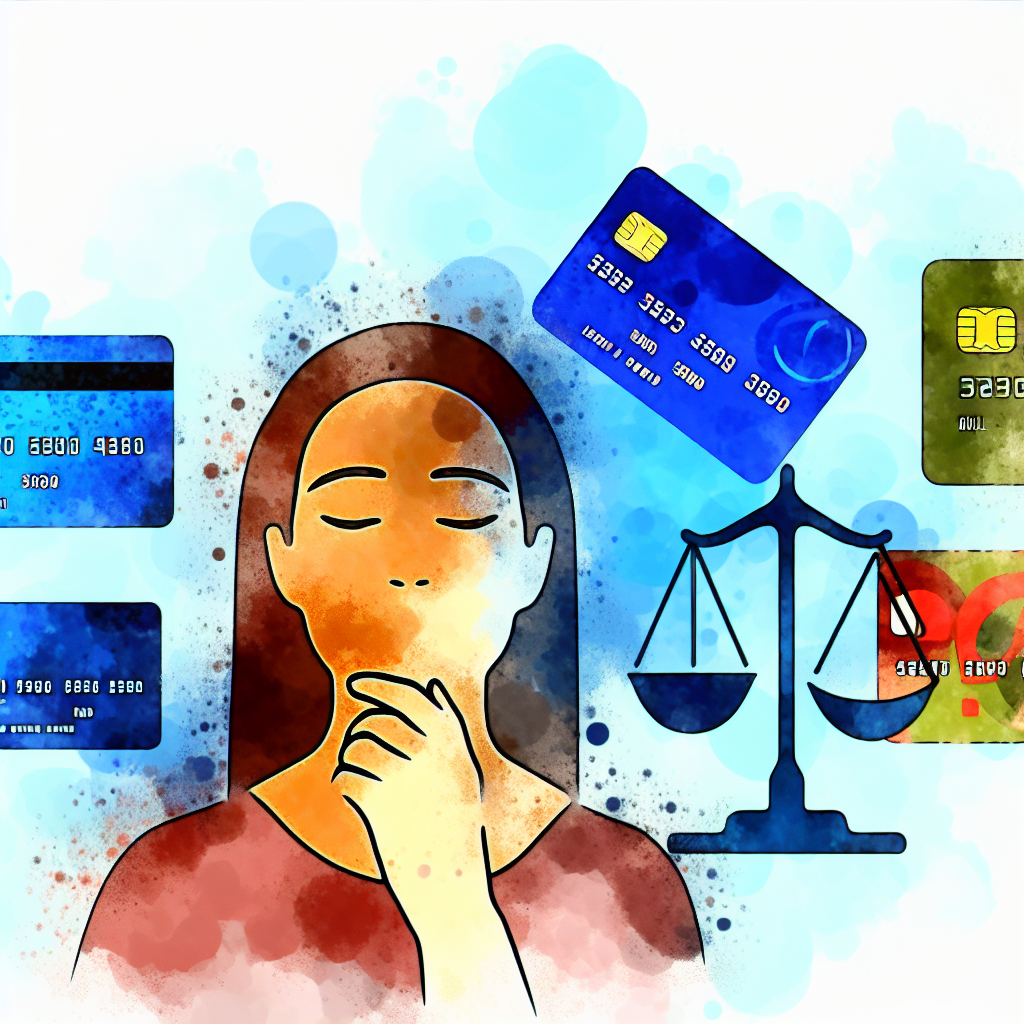Understanding and selecting the best credit card for your needs can be a daunting task. With a myriad of options available in the market, it’s easy to feel overwhelmed. However, having the right credit card can offer numerous benefits, from rewards and cashback to managing your finances more efficiently. This blog post aims to provide a comprehensive guide to help you navigate through the process of choosing the best credit card for your requirements.
Before diving into the various aspects of selecting a credit card, it’s essential to understand that not all credit cards are created equal. Each card comes with its own set of features, benefits, and limitations. Therefore, it’s crucial to align a credit card with your financial goals and spending habits. This alignment will ensure you maximize the benefits while minimizing any potential drawbacks.
Choosing the best credit card involves several steps, each requiring careful consideration. From understanding your spending patterns to evaluating the fine print, this guide will walk you through each step to help you make an informed decision.
Let’s delve into the key topics that will help you in choosing the best credit card for your needs.
Understanding Your Spending Habits
Your spending habits play a pivotal role in determining which credit card will be the most beneficial for you. Without a clear understanding of your spending patterns, you may end up with a card that doesn’t align with your needs.
First, categorize your spending into different segments such as groceries, dining, travel, and entertainment. By doing so, you can identify where you spend the most money. For instance, if you frequently dine out, a credit card offering high rewards on dining would be more advantageous.
Next, evaluate your monthly and annual spending to get a clearer picture. You can create a table to categorize your expenses:
| Category | Monthly Spending | Annual Spending |
|---|---|---|
| Groceries | $400 | $4800 |
| Dining | $200 | $2400 |
| Travel | $100 | $1200 |
| Entertainment | $150 | $1800 |
Having this data at your fingertips will help you identify credit cards that offer the best rewards and benefits tailored to your spending habits.
Understanding your spending also involves recognizing any debts you carry and how you manage your payments. If you typically pay off your balance in full each month, interest rates may not be as critical. However, if you carry a balance, you’ll want to focus on cards with lower interest rates.
Evaluating Your Credit Score
Your credit score is a crucial factor in the credit card selection process. It influences not just the cards you’re eligible for but also the terms you’ll receive.
Begin by checking your credit score through a reputable credit bureau. A high credit score can unlock premium credit cards with better rewards, lower interest rates, and additional perks. On the other hand, a lower score might limit your options to secured or subprime credit cards, which often come with higher fees and fewer benefits.
Here’s a general breakdown of credit score ranges and what they mean:
| Credit Score Range | Rating | Implications |
|---|---|---|
| 800 – 850 | Exceptional | Access to top-tier cards |
| 740 – 799 | Very Good | Qualify for many good cards |
| 670 – 739 | Good | Good terms and conditions |
| 580 – 669 | Fair | Higher interest rates likely |
| 300 – 579 | Poor | Limited choices, secured cards |
Next, understand how the credit card application process impacts your score. Applying for multiple credit cards in a short period can negatively affect your score. Hence, it’s advisable to research thoroughly and apply for cards you’re likely to qualify for.
Improving your credit score should also be a priority. Simple actions like paying your bills on time, reducing your debt, and avoiding making too many inquiries can help boost your score. This, in turn, will expand your options when choosing a credit card.
Exploring Credit Card Types
Credit cards come in various types, each with distinct benefits and features. Understanding these types will help you choose the best credit card for your needs.
Rewards Credit Cards: These cards offer points, miles, or cashback for every dollar you spend. Rewards can usually be redeemed for travel, merchandise, or statement credits. They are ideal for those who pay off their balance in full each month to avoid high interest rates.
Balance Transfer Credit Cards: These cards come with low or 0% introductory interest rates on balance transfers. They are useful for consolidating debt into one card with lower interest, helping you pay off your balance faster.
Travel Credit Cards: Often offering rewards in the form of miles or points, these cards come with travel-related perks such as airport lounge access, travel insurance, and no foreign transaction fees. They are best suited for frequent travelers.
Here’s a comparison table to summarize the key features:
| Card Type | Key Features | Best For |
|---|---|---|
| Rewards | Earn points/miles/cashback | Everyday spenders |
| Balance Transfer | Low/0% intro APR on transfers | Debt consolidation |
| Travel | Travel-specific rewards and perks | Frequent travelers |
By aligning the card type with your specific needs, you can leverage the benefits most effectively.
Comparing Interest Rates and Fees
Interest rates and fees are critical factors that can influence the cost-effectiveness of a credit card. Understanding these elements will help you avoid unnecessary expenses.
Interest Rates: The Annual Percentage Rate (APR) is the interest you’ll be charged on any outstanding balance. Most credit cards have variable APRs, which can fluctuate based on the prime rate. Look for cards with the lowest possible APR if you plan to carry a balance.
Fees: Different credit cards come with various fees, including annual fees, late payment fees, foreign transaction fees, and balance transfer fees. Make sure to read the fee schedule before applying. Here’s a breakdown of common fees:
| Fee Type | Description |
|---|---|
| Annual Fee | Yearly charge for card ownership |
| Late Payment Fee | Fee for missing payment due date |
| Foreign Transaction Fee | Charge for transactions abroad |
| Balance Transfer Fee | Fee for transferring balances |
By comparing different cards based on their interest rates and fee structures, you can find an option that minimizes costs.
Assessing Rewards Programs
Rewards programs can significantly enhance the value of a credit card. Understanding how these programs work will help you choose the best credit card to maximize your benefits.
Most rewards programs are based on points, miles, or cashback. Each type has its own methods of earning and redeeming rewards. Points and miles are often best for travel-related expenses, while cashback is ideal for everyday purchases.
Consider the following when evaluating rewards programs:
- Earning Rates: How many points/miles do you earn per dollar spent?
- Redemption Flexibility: Can you use rewards for a variety of purposes or are they restricted to specific categories like travel?
- Expiration Policies: Do your points or miles expire after a certain period?
A sample comparison between two rewards programs might look like this:
| Feature | Rewards Program A | Rewards Program B |
|---|---|---|
| Earning Rate | 2 points per $1 on dining | 1.5% cashback on all spend |
| Redemption Options | Travel, merchandise | Statement credit, gift cards |
| Expiration Policy | Never expires | Expires after 18 months |
By thoroughly assessing these factors, you’ll be in a better position to select a rewards program that complements your spending habits and financial goals.
Considering Sign-Up Bonuses
Sign-up bonuses are one of the most enticing features credit cards offer. These bonuses can provide substantial rewards, making them a significant factor in your decision-making process.
Credit cards often offer sign-up bonuses ranging from cash rewards to points/miles, conditionally provided you spend a certain amount within a specified time, usually the first 3 months. For instance, a card might offer a $200 cash bonus after spending $1,000 in the first three months.
Here are the key aspects to consider:
- Bonus Amount: The size of the sign-up bonus.
- Spending Requirement: The amount you need to spend to qualify for the bonus.
- Time Frame: The period within which you need to meet the spending requirement.
Here’s a quick comparison:
| Feature | Card A | Card B |
|---|---|---|
| Bonus Amount | $300 | 50,000 points |
| Spending Requirement | $3,000 in 3 months | $4,000 in 3 months |
| Time Frame | 3 months | 3 months |
By evaluating these sign-up bonuses, you’ll be able to find a card that offers substantial rewards with achievable spending requirements.
Analyzing Annual Fees
Annual fees are mandatory charges you need to pay each year for owning a credit card. These fees can range from $0 to several hundred dollars, depending on the card’s benefits and features.
While a card with an annual fee might initially seem less appealing, it’s essential to evaluate whether the rewards and benefits justify the cost. Many premium cards offer higher rewards rates, travel credits, and other perks, which can offset the annual fee.
Ask yourself these questions:
- Does the card offer enough rewards and benefits to justify the fee?
- Do the perks, such as travel credits or lounge access, align with your lifestyle?
- Are there no-fee alternatives that offer similar benefits?
Here’s a comparison to illustrate:
| Feature | Card A | Card B |
|---|---|---|
| Annual Fee | $95 | $0 |
| Travel Credits | $300 | None |
| Rewards Rate | 2 points per $1 spent | 1.5 points per $1 spent |
By carefully analyzing the annual fees in conjunction with the card’s benefits, you can determine if paying an annual fee is worthwhile.
Reading the Fine Print
Before finalizing your choice, it’s crucial to read the fine print. The terms and conditions of a credit card encompass several critical details that can impact your overall experience.
Focus on the following areas:
- Interest Calculation: Understand how interest is calculated and whether there are any special introductory rates.
- Penalty APR: Find out if the card imposes a penalty APR for late payments and how long it applies.
- Rewards Program Terms: Check for any restrictions or limits on earning and redeeming rewards.
Here’s a summary to guide you:
| Key Detail | What to Check |
|---|---|
| Interest Calculation | Introductory APR, Variable rates |
| Penalty APR | Rate, duration, conditions |
| Rewards Program Terms | Earning limits, redemption restrictions |
By scrutinizing the finer details, you’ll avoid unforeseen charges and fully understand the benefits and limitations of the card.
Seeking Recommendations and Reviews
Personal experiences and expert reviews can offer valuable insights during your credit card selection process. These recommendations can help you understand the real-world pros and cons of different cards.
Start by asking friends, family, or colleagues about their credit card experiences. Their first-hand accounts can provide practical insights into customer service, benefits, and potential pitfalls.
Consulting expert reviews and comparison websites can also be beneficial. These platforms often provide in-depth analyses, ratings, and user feedback, which can aid in your decision-making process.
Consider the following sources for recommendations:
- Friends and Family: Personal experiences and advice.
- Online Reviews: Credit card comparison websites and forums.
- Expert Analysis: Financial blogs and professional reviews.
By combining personal recommendations with expert reviews, you’ll have a well-rounded understanding of your options.
Making Your Decision
After thorough research and comparison, it’s time to make your decision. Summarize the data you’ve gathered to ensure you’ve covered all critical aspects.
Create a checklist to aid your decision:
- Spending Habits: Does the card align with my spending patterns?
- Credit Score: Am I eligible for this card based on my credit score?
- Rewards and Benefits: Do the rewards and perks justify any associated fees?
- Interest Rates and Fees: Are the interest rates and fees reasonable?
- Sign-Up Bonuses: Is the sign-up bonus achievable and worthwhile?
- Fine Print: Have I understood all terms and conditions?
Once all these criteria are satisfied, you’ll be well-equipped to choose the best credit card that fits your needs.
Tips for Responsible Credit Card Use
Choosing the right credit card is only half the battle; using it responsibly is equally important. Here are some tips to help you manage your credit card wisely:
- Pay Your Balance in Full: Avoid interest charges by paying off your balance each month.
- Monitor Your Spending: Keep track of your expenses to ensure they align with your budget.
- Utilize Rewards: Make the most of your card’s rewards program by using it strategically for maximum benefits.
By following these tips, you can maintain a healthy financial status and make the most of your new credit card.
Conclusion
Choosing the best credit card for your needs involves a complex decision-making process. From understanding your spending habits to evaluating various card features, every step requires careful consideration.
Remember that the best credit card for you is one that aligns well with your financial situation, spending patterns, and long-term goals. By researching and comparing different options, you can find a card that offers maximum benefits with minimal drawbacks.
Ultimately, a well-chosen credit card can be a valuable financial tool, providing convenience, rewards, and various other benefits, all while helping you build your credit history.
Recap
- Understanding Your Spending Habits: Identify where you spend most to find a card that maximizes rewards.
- Evaluating Your Credit Score: Know your credit score to evaluate your eligibility and options.
- Exploring Credit Card Types: Choose between rewards, balance transfer, and travel cards based on your needs.
- Comparing Interest Rates and Fees: Focus on finding cards with the lowest interest rates and fees to minimize costs.
- Assessing Rewards Programs: Evaluate earning rates, redemption options, and expiration policies.
- Considering Sign-Up Bonuses: Weigh the bonus amount against spending requirements and time frames.
- Analyzing Annual Fees: Determine if the card’s rewards and perks are worth the annual fee.
- Reading the Fine Print: Understand all terms and conditions to avoid unforeseen charges.
- Seeking Recommendations and Reviews: Use personal and expert reviews for comprehensive insights.
- Making Your Decision: Use a checklist to ensure you’ve considered all critical aspects before applying.
- Tips for Responsible Credit Card Use: Practice good habits like paying your balance in full and monitoring expenses.
FAQ
1. What is the best credit card for beginners?
The best credit card for beginners is usually a no-annual-fee card with a straightforward rewards program, such as a cashback card.
2. How does my credit score affect my credit card options?
A higher credit score can qualify you for cards with better rewards, lower interest rates, and additional perks, while a lower score may limit your options.
3. Can I have multiple credit cards?
Yes, you can have multiple credit cards, but managing them responsibly is crucial to avoid debt and maintain a good credit score.
4. What is a balance transfer?
A balance transfer involves moving debt from one credit card to another, usually to take advantage of a lower interest rate.
5. How do sign-up bonuses work?
Sign-up bonuses are incentives offered by credit cards, often requiring you to spend a certain amount within the first few months of opening the account.
6. Are annual fees worth it?
Annual fees can be worth it if the card offers substantial rewards and benefits that outweigh the cost.
7. How can I improve my credit score?
Improving your credit score involves making timely payments, reducing debt, and avoiding multiple credit inquiries in a short period.
8. What should I do if I can’t pay my credit card bill in full?
If you can’t pay your bill in full, pay as much as possible to minimize interest charges and adhere to at least the minimum payment to avoid penalties.











